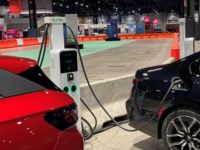NEW YORK—According to a recent survey conducted by McKinsey & Co. and the World Economic Forum, consumers are increasingly interested in autonomous and electric vehicles.
“While the COVID-19 pandemic has created challenges for both automotive manufacturing and sales, OEMs could benefit from favorable consumer sentiment,” says Kersten Heineke, a partner at McKinsey & Co. and the McKinsey Center for Future Mobility who coauthored of the study. “The pandemic appears to have increased consumer awareness about the negative effects of travel, including congested roads and heavy emissions.”
According to Heineke, annual global passenger plug-in EV sales hit three million in 2020—a more than 40 percent year-on-year increase—with 46 percent of fiscal-year sales coming from Europe, 39 percent from China and 12 percent from North America.
Heineke believes the shift in consumer sentiment could also have implications for commercial transport and logistics. Indeed, more than 70 percent of survey respondents stated that delivery of goods should shift from vehicles with internal combustion engines to EVs for long-haul trucking and intracity transport. In addition, more than 40 percent of respondents in all regions claimed they are willing to pay a premium to enable this shift.
In another major shift, low-emission manufacturing is becoming more important to consumers. Of the survey respondents who were considering an EV purchase, over half stated that it was a “moderately” or “extremely important” consideration.
“This development suggests that changing consumer sentiment will affect not only vehicle sales, but also the entire supply chain,” explains Heineke. “Many respondents were also interested in end-of-life vehicle recycling.
“The survey showed that use of sustainable materials is an important consideration for potential EV buyers,” adds Heineke. “Use of a local manufacturer was also moderately to extremely important to many respondents.
“The COVID-19 pandemic has made consumers more likely to use delivery services, via traditional methods and autonomous technology,” says Heineke. “Both quarantine restrictions and the desire to limit human contact [contribute to this sentiment].”
Despite the growing acceptance of AVs, Heineke warns that OEMs face many barriers to adoption. “Overall knowledge of this technology is still relatively low, with many respondents stating that they had never heard of AVs or advanced driver-assistance systems (ADAS), or that they did not fully understand the meaning of these terms,” he points out.
“The lack of consumer education contributes to the relatively low trust in AVs—something that is still pronounced despite the increase in the number of people willing to use them,” claims Heineke. “When we asked survey respondents what kept them from using AVs, most stated that they did not believe the technology was ready.
“Many others stated that they did not believe AV technology was safer than their own driving,” notes Heineke. “Overall, trust is so low that almost half of consumers would not trust OEMs, regulatory bodies or independent third parties to validate technology.”



